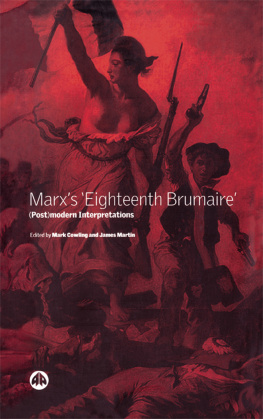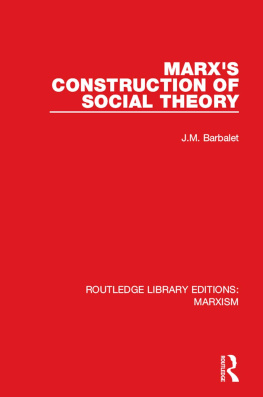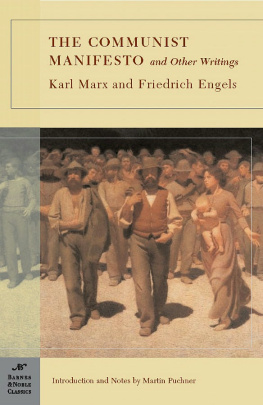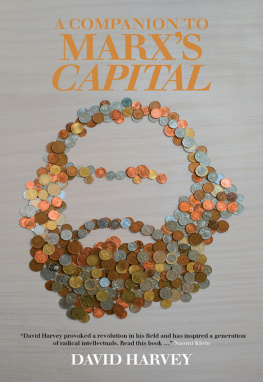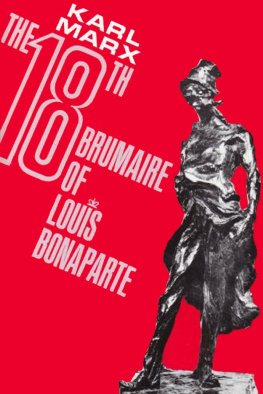Marxs Eighteenth Brumaire
Marxs
Eighteenth Brumaire
(Post)modern Interpretations
Edited by
Mark Cowling and James Martin
First published 2002 by Pluto Press
345 Archway Road, London N6 5AA
www.plutobooks.com
Copyright Mark Cowling and James Martin 2002;
The Eighteenth Brumaire of Louis Bonaparte, in Karl Marx: Later Political Writings, Cambridge University Press, 1996, edited and translated by Terrell Carver. Reproduced by permission of the translator and publisher.
The right of the individual contributors to be identified as the authors of this work has been asserted by them in accordance with the Copyright, Designs and Patents Act 1988.
British Library Cataloguing in Publication Data
A catalogue record for this book is available from the British Library
ISBN 978 0 7453 1830 1 paperback
ISBN 978 1 7837 1674 6 ePub
ISBN 978 1 7837 1675 3 Mobi
Library of Congress Cataloging in Publication Data
Marx, Karl, 1818-1883.
[Achtzehnte Brumaire des Louis Bonaparte. English]
Marxs Eighteenth Brumaire : (post)modern interpretations / edited by Mark Cowling and James Martin.
p. cm.
Includes bibliographical references and index.
ISBN 0745318312 (hardback) ISBN 0745318304 (pbk.)
1. Napoleon III, Emperor of the French, 18081873. 2.
FranceHistoryCoup dtat, 1851. 3. FranceHistoryFebruary Revolution, 1848. 4. FranceHistorySecond Republic, 18481852. I. Title: Eighteenth Brumaire. II. Title: Marxs 18th Brumaire. III. Cowling, Mark. IV. Martin, James, 1968 V. Carver, Terrell. VI. Title.
DC274 .M27 2002
944.07dc21
2002008652
10 9 8 7 6 5 4 3 2 1
Designed and produced for Pluto Press by
Chase Publishing Services, Fortescue, Sidmouth EX10 9QG
Typeset from disk by Stanford DTP Services, Towcester
Printed on Demand in the European Union by CPI Antony Rowe,
Chippenham and Eastbourne, England
Contents
Acknowledgements
The editors would like to express their thanks to the following for their assistance in the development of this book: members of the Marxism Specialist Group of the Political Studies Association (UK) for their offer of contributions; Anne Beech at Pluto Press for her enthusiasm for the project; and the staff at the British Library and at the University of London Library (Senate House) for their help in providing materials.
All references to Karl Marx, The Eighteenth Brumaire of Louis Bonaparte are to the translation by Terrell Carver contained in of this volume. This text was first published in Terrell Carver (ed. and trans.), Karl Marx: Later Political Writings (Cambridge: Cambridge University Press, 1996), pp. 31127. We are grateful to Cambridge University Press for permission to reprint it here.
Where possible, all other references to the works of Marx and Engels are to the (so far) 47 volumes of Karl MarxFrederick Engels. Collected Works (London: Lawrence and Wishart, 1975). These are referenced in the endnotes with the abbreviation C.W., followed by volume and page numbers.
| Introduction |
Mark Cowling and James Martin |
On 2 December 1851, Louis-Napoleon Bonaparte nephew of the great Emperor Napoleon Bonaparte and, since late 1848, elected President of the Second French Republic announced the dissolution of the Legislative Assembly and, with the backing of the army, ordered the parliamentary chamber to be occupied by troops, the leaders of the main parties arrested and placed himself in sole charge of government. A year later he declared himself Emperor Napoleon III, head of the Second French Empire. Bonapartes coup dtat brought to an end not only the republican regime ushered in after the revolution of 1848 but also the period of unstable, limited bourgeois democratic government and experimentation with constitutional monarchy since the defeat of his uncle in 1815. For those radicals and socialists who in 1848 hoped to transform the wave of democratic revolutions into a more substantial movement for economic and social reform, Napoleons coup symbolised and underscored a demoralising defeat at the hands of popular reaction.
Karl Marxs The Eighteenth Brumaire of Louis Bonaparte is a bitter, richly entertaining account of these events by one of the radicals who had observed events at first hand. A journalist, intellectual and self-proclaimed communist, Marx, too, had participated as a propagandist in the events of 1848 as co-founder of the Communist League and in his Manifesto of the Communist Party of that year, co-written with Frederick Engels, he had encouraged socialist revolutionaries to participate in the revolution alongside the republican bourgeoisie in order to bring to the fore the demands of the proletariat. The Eighteenth Brumaire, written and published in 1852, narrated the rise and decline of the revolution in France from the proclamation of the Second Republic to the coup of 1851. By contrast with the Manifesto characterised by its (deliberately) optimistic reading of history as a series of class struggles leading, ultimately, to communism the Eighteenth Brumaire tells a more complex and less progressive story. It is also one of Marxs few lengthy analyses of political history and it is widely regarded as one of his most colourful.text is rarely commented upon at any length. It is the purpose of this volume, one hundred and fifty years after Marxs publication, to begin to fill that gap.
In the remainder of this Introduction we shall give a brief summary of the content of the Eighteenth Brumaire and then discuss its themes in relation to the concerns of later Marxists and the Marxist tradition generally. Finally we offer a brief overview of the content of the chapters that follow.
MARXS EIGHTEENTH BRUMAIRE: THE TEXT
The text of the Eighteenth Brumaire (reprinted after this Introduction in a new translation) is a challenge even for those familiar with Marxs work. Its focus is the transformation of a revolution against a constitutional monarchy (the July Monarchy of Louis XV), through a series of internal disputes between the political groups involved, until the dissolution of the Second Republic by Bonapartes coup. In this respect, the distance between us and the characters and events in question makes the Eighteenth Brumaire an unfamiliar, and consequently rather burdensome, read. Yet the text is more than a description of events. It is also a reflection, amongst other things, on the nature of revolutions, political leadership and class struggle. In this respect, too, Marxists might find the text less instructive than Marxs more theoretical works since these political issues are presented in the form of a concrete set of circumstances whose universal relevance is at best uncertain. Finally, for those accustomed to reading Marxs philosophical studies or his critical engagement with political economy, the Eighteenth Brumaire will seem a curiously unscientific commentary, replete with undeclared normative assumptions and personal invective, richly figurative language and with no evident purpose other than of recounting the events and ridiculing the characters under examination.
Yet if the Eighteenth Brumaire is a challenge to read, it is not because it lacks substance as a work of political commentary. For all its difficulties as a text, it remains fascinating and provocative for Marxists and non-Marxists alike. Before we consider some of the themes that can be said to derive from the


